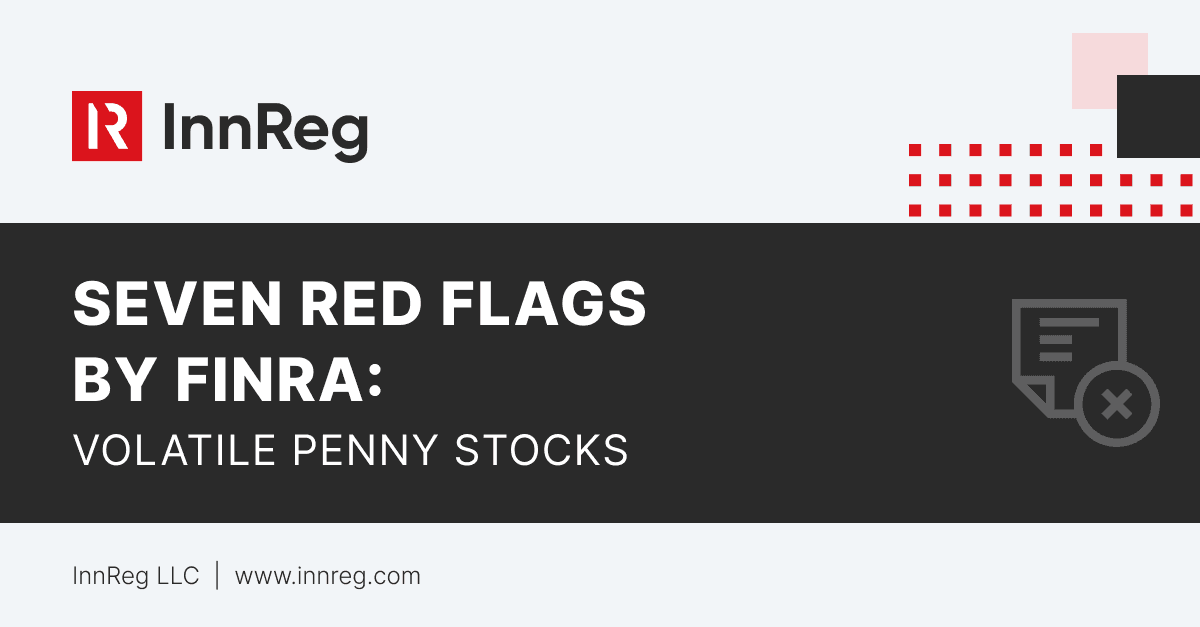Contents
FINRA (Financial Industry Regulatory Authority) penny stock rules are part of the agency’s overall authority over the stock market. Low-priced securities are often known as penny stocks. Penny stocks can be extremely volatile and hard to predict. This volatility makes them a prime target for scams.
Recently, FINRA released a regulatory notice 21-03 describing various “red flags” to watch out for when dealing with these types of securities. As a broker-dealer, you must understand these red flags and look out for them in your transactions.
In this regulatory notice, FINRA listed a large number of red flags to watch, which can be divided into five major categories:
The size and frequency of penny stock trades
Geographical risks
Account creation irregularities
Red flags arising from customer due diligence
Based on the source of the funds used to trade.
Let’s review each category in detail:
See also:

InnReg is a global regulatory compliance and operations consulting team serving financial services companies since 2013. If you need assistance with compliance or fintech regulations, click here.
1. The Size and Frequency of Penny Stock Trades
Red flags for size and frequency of trades include:
Trades in small batches or low-value amounts that circumvent FINRA's recordkeeping requirements for trades, or
Large numbers of high-value trades within a short period, for example, 24 hours.
This concern is especially pertinent if there are long periods without transactions between short bursts.
The reason for the concern is the potential for using low-priced securities as a means to launder money. Therefore, in order to be compliant with Anti-Money Laundering (AML) regulations, broker-dealers must be able to recognize these red flags and take action when they see them.
Another red flag to be concerned about for all users on a trading platform is conducting trades that are likely to result in a loss and do not make sense for the business or the customer’s goals.
2. Red Flags Associated With Geographical Risks
Red Flags to be aware of when dealing with foreign transactions:
A customer whose funds either originate from or were transferred to the exchange or a location outside of the state or country where the account is registered
A customer who makes transactions in a jurisdiction that does not have anti-money laundering provisions or is known to have inadequate protocols, or in a jurisdiction known to be a source of money laundering issues
FINRA recommends that broker-dealers be cautious if a customer sets up offices or moves offices into jurisdictions that either have inadequate or nonexistent AML protocols or regulations. This caution is particularly relevant if that customer continues to want to trade frequently using low-priced securities.
3. User Profile Irregularities
When dealing with red flags associated with a user profile, be on the lookout for:
A customer or account that is always changing its IP address, account name, or the people associated with the account
The creation of multiple accounts associated with one business, especially if separate accounts do not make logical business sense
When dealing with corporate accounts or an account for a business, having the account set up in a jurisdiction other than the business's primary location, particularly if it does not make logical sense for the business to set up such an account.
4. Red Flags Arising From Customer Due Diligence
When doing the customer due diligence required of broker-dealers, red flags include:
Accounts that do not have proper Know Your Customer (KYC) information, particularly regarding the source of the funds used to fund transactions,
The sender or recipient of the funds or virtual assets being unaware of the details of the transaction or providing inaccurate information regarding the transaction, and
Customers who provide forged documents or photographs of other people when setting up their accounts.
5. The Source of the Funds or Wealth Used to Trade
It is also important to be aware of where customers are getting the funds to trade on the stock market.
Customers who use credit cards or banks associated with known fraud schemes or money laundering activities, or who are based in countries known for this type of activity,
Customers who use multiple credit cards or bank accounts in transactions on a single trading account
Customers or accounts which give inadequate or incorrect information regarding the source of the funds and who owns the funds.
Conclusion
If, as a broker-dealer, you come across any of these red flags, you must alert the proper authorities at FINRA and the Financial Crimes Enforcement Network (FinCEN), which deals with both domestic and foreign money laundering schemes. If you are unsure how to appropriately identify or report them, we are available to discuss with you further. Send us an email to start the conversation: info@innreg.com.
How Can InnReg Help?
InnReg is a global regulatory compliance and operations consulting team serving financial services companies since 2013.
We are especially effective at launching and scaling fintechs with innovative compliance strategies and delivering cost-effective managed services, assisted by proprietary regtech solutions.
If you need help with broker-dealer compliance, reach out to our regulatory experts today:
Published on Jan 29, 2022
Last updated on Oct 20, 2023
Related Articles
Latest LinkedIn Posts













